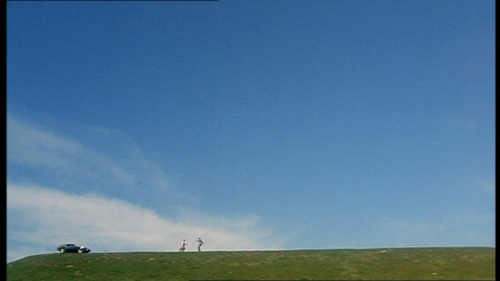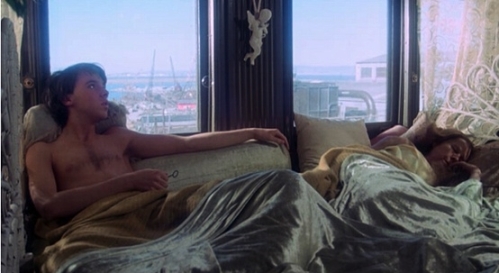Well I find myself in a bit of a pickle: I’m falling back in love with the music of Cat Stevens, or should I say the artist formerly known as Cat Stevens who, since 1977, has gone by his reborn Muslim name Yusuf Islam.
And therein, more or less, lies the source of the problem.
More on that in a minute.
First, I need to put forward a new title in our Perfect Album series, and I must do so through a slightly meandering story (have faith, it all comes together eventually)…
Part I: In which a young Milo Pal discovers a magical film
As a high schooler in the late 80s I sat down one night to watch the cult classic film Harold and Maude, and it blew my mind.
You know those films, Pal, the ones that showed you early on that film is an art form that can do more than entertain; that they can also provoke and challenge? This is one of mine. I loved everything about this dark comedy about a 20-year-old man child obsessed with death who learns how to live from his 79-year-old “girlfriend”. Through the ick factor and the dark edges, there is so much humour, sweetness and beauty in this film.
Perhaps the thing I loved most was the music. There wasn’t really a score, just a handful of folk songs from a guy I’d never heard of before; a guy with a voice that was sweet and soaring one moment, growly and wise the next. A guy named Cat Stevens. The songs and lyrics fit the film perfectly. I can’t describe it better than Jordan Cronk does in this 2012 review in Slant Magazine:
“And yet the Cat Stevens soundtrack—unquestionably one of the greatest in the history of the medium—that plays as both running commentary and harmonic transition device, adds an essential dimension to (director Hal) Ashby’s vision, quelling the manipulation of a traditional score while still reflecting and reinforcing his motifs. Stevens’s lyrics work almost as voiceover narration, coloring and enlivening an otherwise dark, deadpan comedy. He’s an omniscient presence, a character unto himself, a spiritual gateway for an audience cold to such guileless expressions of humanity.”
This probably only works for those who’ve seen the film, but I can’t resist providing a few samples, pics with lyrics:

I used to walk alone / Every step seemed the same / This world was not my home / So there was nothing much to gain

So on and on I go / The seconds tick the time out / There’s so much left to know / And I’m on the road to find out

And if you want to sing out, sing out / And if you want to be free, be free / Cause there’s a million things to be, you know that there are / You know that there are

I think I see the light / Coming to me, coming through me / Giving me second sight / So shine, shine, shine
A beautiful marriage of song and visual.
Needless to say, I joined the cult of Harold and Maude and have been a member ever since though, until recently, it had been years since I last watched it.
Part II: In which a young Milo Pal discovers an almost perfect album
One thing was abundantly clear after first viewing – I needed that soundtrack immediately. But wouldn’t you know it, a soundtrack for Harold and Maude was inexplicably unavailable at that time. So I bought the next best thing:
It was one of Cat’s more renowned albums and happened to have a bunch of the Harold and Maude songs on it, so I purchases up the cassette and popped it into the old Sony Walkman, and what I heard was good, it was very good indeed.
These were folk songs — simple and sweet — but with balls. It wasn’t just a guy plucking a guitar and softly crooning (which is what I thought folk music was). The music was full — driving and urgent. There were drums. Songs built to a crescendo. The voice was arresting, potent and expressive. At times he sounded angry. Every song seemed to be about traveling or searching. Cat wasn’t sure what he wanted, but he knew he wouldn’t find it sitting still:
Miles from nowhere
I guess I’ll take my time
Oh yeah, to reach there
Sometimes he did provide answers. The sense of spirituality and righteousness that would eventually lead him to Islam was already strong:
Yes the answer lies within
So why not take a look now
Kick out the devil’s sin
Pickup, pickup a good book now
I listened to Tea for the Tillerman often but would not, at the time, have declared it perfect. The thing had orchestral touches I found cheesy and a couple of songs I could have done without, most notably the sappy “Sad Lisa”. That song just bugged me.
But overall, for a teenage boy pondering the meaning of life and asking more and more questions about the religion he’d been taught, this was powerful stuff. I was a budding Cat fan.
Then, tragedy…
Part III: In which something terrible happens
In 1989, the Ayatollah Khomeini declared a fatwa ordering Muslims to kill author Salmon Rushdie for writing his great novel The Satanic Verses. And Cat, who’d been Yusuf Islam since 1977, and who had stopped making music and had distanced himself from the secular music he’d made, hopped on board and said in a couple different forums that he was down with Khomeini. Sure, he subsequently backpedaled, but go ahead and look up the quotes for yourself. You can even watch them on YouTube. It’s clear his fundamentalist-soaked mind had decided death was a fitting punishment for free speech.
Pathetic.
As my friend Jerry lamented at the time — this, from the guy who wrote “Peace Train”.
I can’t tell you I nobly boycotted Cat/Yusuf from that moment on – I have certainly hummed along to “Morning Has Broken” more than a few times since then – but the sad, ugly incident certainly turned what might have been a lifelong musical love affair into a temporary fling. Plans to buy Teaser and the Firecat were cancelled. Tea for the Tillerman crawled to the back of the cassette drawer and was not replaced when growing up Pal entered the digital age.
Part IV: In which an older Milo Pal reconnects and finds perfection
With Cat and Maude and Harold and Yusuf far from mind, I headed down to the library recently to see what free entertainment I could dig up and just happened to toss Harold and Maude and Tea for the Tillerman into the overflowing pile of music and movies I greedily walked out with, and it was not until I got home that I realized I had inadvertently reintroduced into my life this natural film/album combo.
(If I believed in fate…)
No matter, I watched Harold and Maude – introducing it to my 14-year-old daughter – and it was every bit as good as I remembered and, to my slight surprise, the kid really liked it too.
Then I listened to Tea for the Tillerman.
And man oh man what a trip that turned out to be.
I liked that album back in the day. I like it even more now. It’s been a long time, but the whole thing was still vivid in my mind. Every song is a gem (even sappy Sad Lisa is not bad!). All the yearning and searching is still there, but the wisdom of it stood out even more now that I’m 20 years down the road.
“Father and Son” is the obvious stand-out now, being able to hear it as a dad. The aforementioned teenage daughter and I have been having some big talks lately about her life and the future. She’s in the mode of dreaming big. She’s going to write novels, she’s going to travel the world. University seems like a waste of time. She is committed to living an extraordinary life.
Do it, I tell her. I’m all for it. Be extraordinary. Then, because I helped make her, I lapse into offering some practical advice. It’s certainly not the same dynamic as the story that that plays out in “Father and Son”, but I do find myself echoing some of the Father’s lines:
“I was once like you are now.”
“There’s so much you have to know.”
“Look at me, I am old, but I’m happy.”
So now I’m the old man. OK. I can live with it. It’s testament to Cat’s lyrics that both sides of that song hold up and are fairly represented.
The other thing that strikes me now about Tea for Tillerman is the length. At less than 37 minutes it is lean and precise. No filler, no wasted moments. Two of the songs are less than two minutes. Cat says what he needs to say and gets out. With my impatient, aging, Twitterized mind, I increasingly love brevity (though I fully recognize I am not demonstrating it in this long-winded post — sorry!). So I admire the hell out of any artist who can say a lot — and say it briefly.
And so, I will now declare it – I consider Tea for the Tillerman a perfect album.
Part V: In which things remain maddeningly unresolved
I’ve been so moved by my rediscovery of this classic, I needed to revisit the elephant in the room. What about the fatwa? Does Cat — sorry, Yusuf — still stand by what he said? I’d heard he’s returned to making music and no longer renounces what he made before. Could it be that his rational mind has returned? Is he ready to say “shame on me for that whole Rushdie thing”?
Sadly, not so much.
The most recent thing I could find was this interview with Rolling Stone. Here’s the relevant chunk:
It’s still a sensitive subject for Yusuf. When I broach it, his son looks up, concerned. “People need to get over it,” says a clearly irritated Yusuf. “It’s 25 years ago. I’ve got gray hair now. Come on. I was fool enough to try and be honest and tell people my position. As far as I’m concerned, this shouldn’t be the subject of my life.”
That appears to be the end of it, and Yoriyos looks relieved. But Yusuf can’t help himself. “I’m a firm believer in the law,” he says. “I was never a supporter of the fatwa [against Rushdie], but people don’t want to hear that because they keep saying that I believe in the law of blasphemy. All I’m saying is, how can you deny the Third Commandment? It’s an Islamic principle that you must follow the law of the land where you reside.”
Unapologetic answers like that are what make Rushdie and his many supporters unable to forgive Yusuf, and he knows their feud will never end. “That’s the way life is,” he says. “I don’t want to put myself in this bracket, but if you look at any messenger, there’s going to be an antagonist.”
Well there you have it. Still miles from nowhere, if you ask me.
I suppose I’m glad Yusuf found the answers to the questions he was asking on Tea for the Tillerman. It’s just a shame those beliefs need to veer into the odious. Yusuf has his beliefs, I have mine – and at the top of the pile is that if there is one thing in this world that actually is sacred, it’s free speech.
So what to do?
Is this a case of needing to separate the artist from the art? Can I love the music but reject the man? Or does listening to the music intrinsically mean support for the musician?
I don’t know.
Later, Pal.





